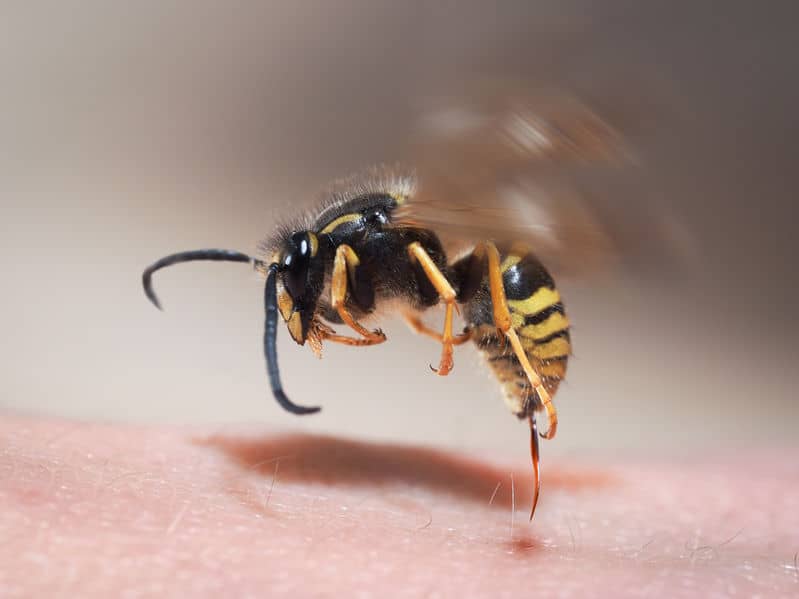The threat of a wasp sting is very real. Many of us have heard that bees die when they sting. But what happens with wasps?
Wasps can sting multiple times. They principally sting as a way of paralyzing their prey, but they will also sting in self-defense. They will keep stinging until they perceive the threat to have gone. Wasps do not die when they sting, unlike bees.
How does a wasp sting work?
The wasp stinger is like a needle. It is designed to penetrate its prey and then retract back into its body to be used again and again if necessary. The wasp releases venom which is why stings can be so painful.

Wasp sting vs bee sting
Bees can only sting you once because their stingers are barbed and rip out of their body when they move away. This kills the bees. The stinger on a wasp, however, remains intact so they do not die, and indeed can inflict multiple stings. This means that generally, bees will be far more reticent than wasps about when and where they will sting.
Some wasps, although very rare, will give a warning before stinging. The ‘murder wasp’ is known to fly back and forth snapping its mandibles as a warning to move away. The warrior wasp, found in South America, is also known as the drumming wasp as they will drum their wings as a warning.
Why do wasps sting?
Wasps have stings as the primary way to catch prey. They will sting other insects as a means of paralyzing them. Check out this article to see which wasps have the most painful stings.
When it comes to humans it is used as a defense mechanism. Mostly wasps will only sting when they sense a potential threat to their nests or to themselves. Many wasps can be handled without a sting inflicted as long as pressure is not put on their bodies.
Another situation when wasps may sting is in conflict over food. If a wasp perceives that you are competing with them for food and then feel threatened then their instinct is often to attack rather than to run.
That is why flapping hands at a wasp to get them to go away can actually be counterproductive. Wasps can also release a chemical to let other wasps know they are being attacked, which will attract more wasps. The best action is to keep calm and move away from the wasp as much as possible. See this article on wasps’ attraction to food.
The real risk from wasp stings arises when they swarm and multiple stings are inflicted. This will mostly only happen if a nest is disturbed.
Can vinegar be used to treat wasp stings?
It has been observed that wasp stings can potentially be neutralized to some degree by applying vinegar. This is because a wasp sting has an alkaline effect on the body, the acid in the vinegar could help counter the alkaline. Be careful if trying this as bee stings can actually be made worse by vinegar, so be sure it is a wasp and not a bee sting. The pain from wasp stings in most cases will dissipate within an hour.
Do all wasps sting?
Only the female wasp can sting as the stinger is actually part of the female reproductive organs. Male wasps are not purposed to hunt or protect the nest, but rather to mate with the queen. The male wasps will mate with the queen and then die, as they have no further use. The male wasps will impregnate the queen before she goes into hibernation for the winter. She will be the only member of the colony to survive, starting a new colony in the spring.
